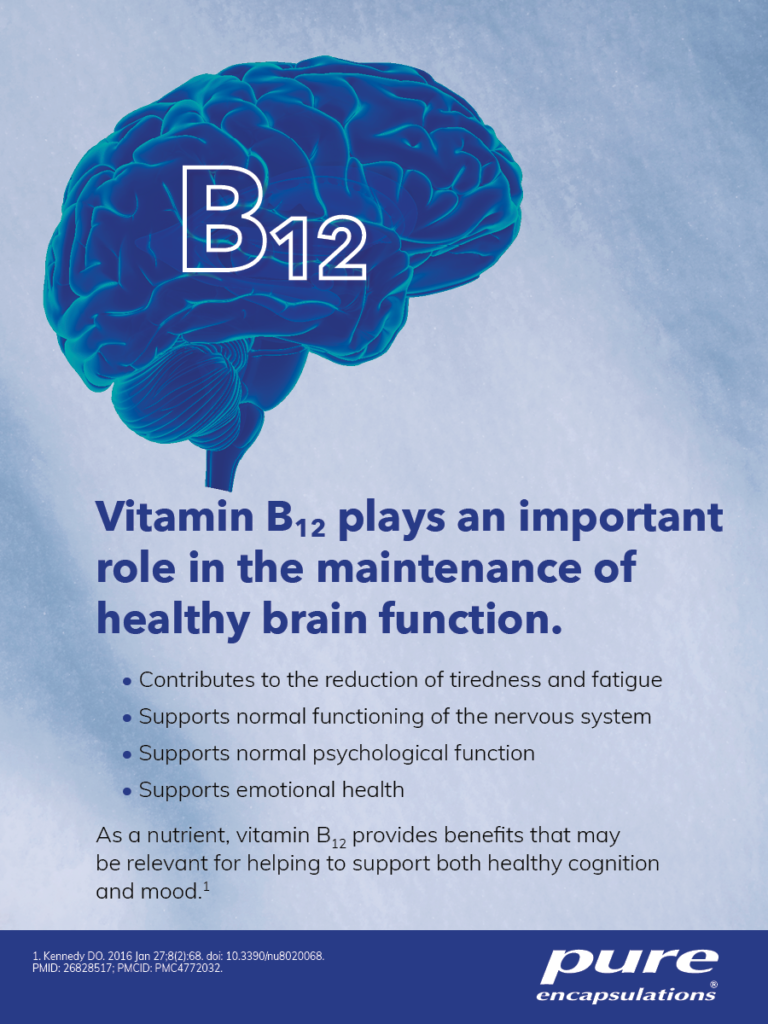People take supplements to improve or optimize their health. So what happens when you look at the label, and the ingredient list is filled with unrecognizable additives?

As a nutrient, vitamin B12 has several important roles, including contributing to the maintenance of healthy brain function. As a partner to folate, vitamin B12 is also important for transferring and supplying what are called “single carbon units” or methyl groups. Transferring methyl groups through the process of methylation is critical for the formation of deoxyribonucleic acid (DNA), ribonucleic acid (RNA), neurotransmitters and the protective casing or sheath that surrounds nerve cells called myelin.
As a player in normal cognitive functioning, vitamin B12 has a role in supporting mental health. A deficiency in B vitamins is known to be associated with low mood and cognition. A recent analysis even suggests that vitamin B12 supplementation may support positive mood.1
Along with potentially supporting emotional health, vitamin B12 can be critical for supporting healthy cognitive function. Studies on supporting cognitive health due to low vitamin B12 are prevalent in the published research.2 Due to these benefits, an international consensus statement published in 2018 recommends B-vitamin supplementation for maintaining brain health and cognitive function when appropriate.3

Part of the benefits of vitamin B12 for supporting healthy brain function likely stem from its effects on homocysteine. Homocysteine is an amino acid formed in the body during healthy functioning. Typically, levels of homocysteine are kept low by vitamins B12, folate and vitamin B6. However, if levels of these B vitamins are inadequate, homocysteine levels can build up.
Clinical studies show that vitamin B12 is vital in the metabolism of homocysteine. Vitamin B12 is required by the enzyme that converts homocysteine back to methionine.4 Vitamin B12, in combination with vitamin B6, folate, and betaine can provide a highly bioavailable combination of nutrients integral to maintaining healthy homocysteine metabolism and cardiovascular health.5
Another key factor in vitamin B12’s ability to support healthy brain function is its role in neurotransmitter production. Vitamin B12, like folate, is needed for the production of serotonin, norepinephrine and dopamine. Standard support for regular low mood often targets these neurotransmitters. As such, serotonin is often described as the “feel good” neurotransmitter of the brain. By supporting the production of these neurotransmitters, vitamin B12 plays a significant part in healthy brain function.
Vitamin B12 is found in a number of foods, although mostly of animal origin, including liver, seafood, beef, dairy products and eggs. Vegetarians often do not get enough vitamin B12 and typically need to supplement the vitamin. For supplementation, the active forms of vitamin B12 are often preferred, including methylcobalamin and adenosylcobalamin, although hydroxycobalamin is readily converted as well.
As a nutrient, vitamin B12 plays a crucial role in healthy brain function that supports mental health. Research suggests benefits that may be relevant for helping to support both healthy cognition and mood.

Ask The Expert
Should I take vitamin B12?
Dr Greenblatt- It depends. Having low B12 is quite common and while standard labs may help in identifying individuals who may need the vitamin, they don’t directly measure levels reaching the brain. Vegans and vegetarians typically need supplementation, and it likely should be considered for individuals in need of support for emotional wellbeing and cognition.
I am a vegan and heard seaweed is a good source of vitamin B12. Is that true?
Dr Greenblatt- Some data suggests that nori, a type of seaweed, shiitake mushrooms and soy yogurt might provide vitamin B12. However, studies of long-term consumption of these foods for maintaining adequate levels in humans have not been performed. It may be worth considering supplementation or the consumption of fortified foods to maintain adequate Vitamin B12 levels.
Does vitamin B12 support a healthy mood?
Dr Greenblatt- Vitamin B12 helps to maintain a normal mood. If a person is not consuming adequate vitamin B12, supplementation may be of benefit.
Can you get too much vitamin B12?
Dr Greenblatt- Vitamin B12 supplementation is typically well tolerated with minimal, or only mild, side effects. While there is no official upper limit of safety, there are cases of side effects from higher doses of the vitamin. Side effects can include feeling wired or excessive energy, headache, nausea, diarrhea, skin rash and fatigue. If you are taking high doses and think you are having side effects, stop supplementation and consult with your primary care doctor. In some cases, switching forms of the vitamin may reduce or eliminate concerns.

A pioneer in the field of integrative medicine, James M. Greenblatt, MD, has treated patients since 1988. After receiving his medical degree and completing his psychiatry residency at George Washington University, Dr. Greenblatt completed a fellowship in child and adolescent psychiatry at Johns Hopkins Medical School. Dr. Greenblatt currently serves as the Chief Medical Officer at Walden Behavioral Care in Waltham, MA and serves as an Assistant Clinical Professor of Psychiatry at Tufts University School of Medicine and Dartmouth College Geisel School of Medicine.
An acknowledged integrative medicine expert, educator, and author, Dr. Greenblatt has lectured internationally on the scientific evidence for nutritional interventions in psychiatry and mental illness. Through three decades of practice and research, Dr. Greenblatt is a leading contributor to helping physicians and patients understand the role of personalized medicine for mental illness. To learn more about the author, please visit www.JamesGreenblattMD.com.
- Borges-Vieira JG, Cardoso CKS. Nutr Neurosci. 2022;1-21. doi:10.1080/1028415X.2022.2031494
- Sashindran VK, Aggarwal V, Khera A. Med J Armed Forces India. 2022;78(1):94-98. doi:10.1016/j.mjafi.2020.11.003
- Smith AD, Refsum H, Bottiglieri T, et al. J Alzheimers Dis. 2018;62(2):561-570. doi:10.3233/JAD-171042
- Halsted CH, et al. Proc Natl Acad Sci USA. 2002 Jul 23;99(15):10072-7.
- O’Leary F, Samman S. Nutrients. 2010 Mar;2(3):299-316. doi: 10.3390/nu2030299. Epub 2010 Mar 5. PMID: 22254022; PMCID: PMC3257642.
Share:
Related Posts

Why Would I Test Positive To Foods On A Dietary Antigen Test That I Don’t Eat?
Written by Precision Point Diagnostics | 2025 True food allergies are when the body develops antibodies against a particular food, or a related food. Patients

Mitochondria: The Overlooked Link in the Gut-Brain Axis
Written by Dr Sarah Daglis | 2025 The gut-brain axis is well-established, but there’s more to this dynamic relationship than meets the eye. A vital

Unlocking Respiratory Resilience Through Functional Medicine
Article written by Dr Michelle Clark Naturopathic Doctor Clinical Education Manager, FxMed Published 1 September 2024 People take supplements to improve or optimize their health.

AHCC: Unlocking the Immune Intelligence of Shiitake Mycelia
Article written by Jessica Sanders BSc. (Psy), Dip Nat, Dip Med Herb Technical Projects, FxMed Published 1 September 2024 People take supplements to improve or

Life After Weight Loss Meds
Kathi Head, ND February 20, 2025 You would have to have been spending glorious hours lying on the beach on a desert island not to


